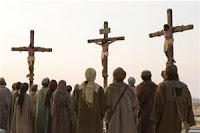 St Anne’s Brown Edge Seventh Sunday after Trinity 2016
St Anne’s Brown Edge Seventh Sunday after Trinity 2016Deuteronomy 30.9-14, Psalm 25.1-10, Colossians 1.1-14, Luke 10.25-37.
Question – should Christians
be nice and neighbourly?
Answer – Yes, of course they
should be nice and neighbourly.
Question – is that it then; are
Christians simply those who are nice and neighbourly?
Are there not a lot of non-Christians who are just as nice and neighbourly – sometimes even better at
it than Christians are?
Is that not the difficulty
when we come to consider such a well-known parable as the Good Samaritan?
Been there, done that,
bought the T-shirt and know what it is all about.
It is Jesus offering a good
moral lesson about being a good neighbour – and that neighbour happens to be
anyone in need we might happen upon.
Even taken at that level
this parable is deeply challenging – well at least I find it is.
 When for example, I see
people begging on our streets, or little fly covered brown children with big
potbellies and skinny arms and I am being asked to give the cost of a couple
cups of coffee.
When for example, I see
people begging on our streets, or little fly covered brown children with big
potbellies and skinny arms and I am being asked to give the cost of a couple
cups of coffee.
With modern technology and
communication, neighbourliness keeps on expanding.
It is good if we take a
deeper look at this multi-layered parable. First, we have to look at what gave
rise to this story Jesus told.
 We need to remember that
Jesus is heading to Jerusalem where he knows what awaits him at the hands of
the Jewish authorities and the Roman rulers.
We need to remember that
Jesus is heading to Jerusalem where he knows what awaits him at the hands of
the Jewish authorities and the Roman rulers.
Luke is a Gospel of
journeys, similar to mountains being an important feature for Matthew’s Gospel.
Therefore, journeys and
stories about journeys are always important in Luke’s Gospel. (Emmaus Road)
Jesus is on a journey to
Jerusalem and as he sets off it is interesting to note in Luke 9.51
‘As
the time approached for him to be taken up to heaven, he set his face towards
Jerusalem.’
Following this, we have a
strange little incident of a Samaritan village not wanting to welcome him.
Perhaps they didn’t want to associate with this troublemaker and bring yet more
opprobrium down upon them.
Perhaps Jesus’s encounter
with a Samaritan woman at the well had not yet filtered through to them.
On this occasion, for their
lack of hospitality, James and John, the sons of thunder, ask if they should bring
fire down from heaven upon them. They receive a stern rebuke from Jesus for
making such a suggestion.
Jesus journeys with a large
group of disciples walking alongside him. They are sent off in pairs to preach
the Good News that the Kingdom of God is near at hand.
Those numbers will all fall
away until he climbs Calvary’s Hill accompanied only by a few devout women and
possibly the young disciple John. Woman and children were of no account and of
no threat whatsoever.
Along the way, an ‘expert in
the law’ came to Jesus with a test question.
The question was common
enough, to which as an expert in the law he would of course known the
answer. He wants to see what answer
Jesus gives – to see if Jesus is orthodox in his teachings. Jesus, as he often does, turns the question
back to this expert in the law.
You tell me, what does the
Law say?
The ‘expert’ quotes a
summation of the Shema Prayer. A bedrock prayer for Jewish people, both then
and now.
He answered, “‘Love the Lord
your God with all your heart and with all your soul and with all your strength
and with all your mind]; and, ‘Love your neighbour as yourself.’”
The
‘expert’ pushes this further; he has a point to make. Perhaps he has heard that
Jesus has been keeping company with tax collectors and sinners, prostitutes and
harlots. He had touched dead bodies and lepers, even healing a Roman
centurion’s servant.
Jesus
was apparently, openly and flagrantly disregarding the purity laws, the
exclusivity, and the peculiar calling of God’s people. To be holy and kept from
defilement by not engaging with Gentiles and sinners.
The
stage is set for Jesus to tell the parable of the Good Samaritan.
This
is one of those lovely parables where, with a bit of imagination, we can we
enter right into the story.
It
is worth reading like this and to imagine yourself as one of the characters in
the story.
On
the road from Jerusalem to Jericho, we have a man who fell among robbers.
Well,
he was unfortunate but then again a bit stupid travelling down that dangerous
road alone.
Those
who rescue people off mountains or pluck them from the sea always intrigue me.
On occasions
it would appear it is pure stupidity that has brought people into danger. Yet
the rescuers never see it like that. Here is person in danger and difficulty,
let see if we can rescue them.
‘Those
people who depend on food banks and other handouts, they have only themselves
to blame.’ All that war in Africa, it’s
the way they are, it is all tribal. It is their own fault really; we can do
little to change things.
So,
the story continues first with a Priest passing by down from Jerusalem to
Jericho.
This
direction is important.
Why?
Because
if the Priest had been going to Jerusalem it could be a little more
understandable that he left the injured man alone. It would have been a great
honour and privilege to be called as a Priest to Temple Duty. Like Zechariah,
John the Baptizer’s father,
If
he was going to the Temple to fulfil this calling he would not want to defile
himself with blood and possible a dead body. That would make him ritually
unclean and therefore unable to attend to his duties.
I
couldn’t possibly turn aside and help you, I am in my Sunday best and simply
must get to church because they are depending on me.
Going
the other way, from Jerusalem to Jericho, after the Temple Duties are over… "Not everyone who says to me,
'Lord, Lord,' will enter the kingdom of heaven, but only the one who does the
will of my Father who is in heaven.”
Straight from Church singing,
Lord, Lord and straight into an argument, or bad temper, or ignoring someone in
need or whatever…
Straight from serving in the
temple and ignoring someone in need – hello Mr Priest heed the prophet Hosea
6.6. For I desire mercy, not sacrifice,
and acknowledgment of God rather than burnt offerings.
Ditto the Levite – who in
some ways was slightly higher up the ranking than Priests. They were
descendants of the ancient tribe of Levi and in charge of worship in and around
the Temple.
Then along comes the
Samaritan – and if this was Panto you would all be booing now.
Because of this parable
becoming so well known, the word
‘Samaritan’ has changed from being a word of scorn and derision, certainly
among first century Palestinian Jews, to one that for us means someone one
doing a worthy act. Or, indeed the organisation that has taken that name, helping
thousands of people rethink taking a path of self-destruction.
The Samaritan appears to be
very resourceful and have about him the wherewithal to help the man who had
fallen among thieves.
Most importantly, he had the
donkey on which to transport the injured man to the nearest Inn.
What and where are the ‘donkeys’
today that help us meet the needs of those we encounter? Those who find
themselves in some distress or other.
That might be a Foodbank for
example.
We might then want to ask
another question about the safety of travelling down that road. Isn’t there something
that could be done to make it safe for single people to travel down that road?
We might want to ask why is
that we have got ourselves in to such a place in 21st century
Britain that more and more people are having to rely on Foodbanks?
As well as being well resourced and having a donkey, the Samaritan shows incredible vulnerability and a willingness to be taken for a ride - but not on his own donkey this time.
Notice he gives the
Innkeeper two silver coins and says to give the injured man whatever was needed
and he would pay the cost next time he passed by that way.
(By the way, let’s just
remind ourselves this is a story and you will not be able to find
archaeological evidence for the Inn of the Good Samaritan.)
Pay the Innkeeper any extra
expense – that would have probably had a few laughs and side comments from
those listening.
Umm, yes, you brought in a
man injured. Well now let me see, yes there were certainly some additional
cost…
In effect offering a blank
cheque – extremely rash and foolish, but that is outrageous love for you!
Therefore, says Jesus, you tell me, who do you think was neighbour to this man.
The one who showed mercy was the lawyers reply. ‘Then, go and do likewise’ says Jesus.
Question – should Christians
be nice and neighbourly?
Of course and much, much
more than simply been nice kind and neighbourly.
This is about the Kingdom of
God and what it looks like through the eyes of Jesus.
Jesus would indeed have
known about Hosea 6.6.
Also from the prophet Isaiah
1.14 I hate your New Moon Festivals and
your appointed festivals. They've become a burden to me, and I'm tired of
putting up with them.
The chosen people of God had
become experts at straining out gnats and swallowing camels.
I think Jesus got annoyed
and even angry at times when confronted with this blindness. The love and mercy
of God hidden behind the strict adherence to the Law and the customs.
Matthews 23.24 You blind guides! You strain out a gnat but
swallow a camel.
Now we as the People of God
today wouldn’t do that sort of thing would we?We are nice, kind and neighbourly.
Brilliant as a starting
place – but we need to go way beyond that to give our all to the building up of
God’s Kingdom. Labouring to make the Lord’s Prayer a reality.
"Not
everyone who says to me, 'Lord, Lord,' will enter the kingdom of heaven, but
only the one who does the will of my Father who is in heaven.”
I want to leave you to
ponder on what the will of the Father is for you, for this place, for this
Church, for our Nation and for the world.
Let us pray;
Pour out upon us a fresh
indwelling of the Holy Spirit; make us bold and courageous in sharing faith in
both word and deed for your Kingdom’s sake we ask.
Amen











